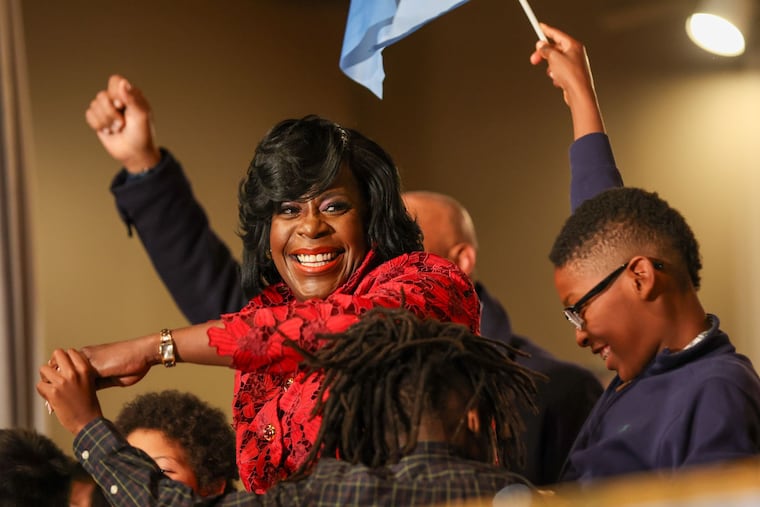What Cherelle Parker said about political rivalries, her ex-husband, and charter schools during her victory speech
Parker recounted the story of her campaign, addressed difficult moments in her past that she usually omitted from her stump speech, and gave some hints about how she plans to govern.

In her long and passionate victory speech Tuesday night, Mayor-elect Cherelle Parker hit on all the major themes of her history-making campaign, such as her personal story, her plan for year-round schooling, and her desire to make Philadelphia the “safest, cleanest, greenest city.”
But then she said a lot more.
» READ MORE: Democrat Cherelle Parker will become Philadelphia’s first female mayor
Joined on the stage of the sheet metal workers union hall by her family, friends, aides, and dozens of elected officials, Parker shared stories from behind the scenes of her campaign, addressed difficult moments in her past that she usually omits from her stump speeches, and gave some strong hints about how she plans to govern.
Here are some notable lines from her speech and their context:
Philadelphia’s political factions
The relationships among the various regional political organizations that wield significant influence over elections in specific corners of the city are an important dynamic in Philadelphia politics.
The power of those groups has faded somewhat over time, but they remain relevant. Parker, for instance, got her start in the Northwest Coalition, and she was essentially unchallenged in her elections as a state representative, City Council member, and 50th Ward Democratic leader thanks to the group’s dominance in parts of Northwest Philadelphia.
Rivalries and alliances among the groups come and go, and Parker’s comment about tribal warfare made clear that she is aware of the potential for opposition from politicians in one of the other groups — and wants to squash it.
The biggest potential trouble spot for Parker is likely her relationship with the South- and Southwest-based group founded by the late Hardy Williams and now led by his son, State Sen. Tony Williams. The elected officials from that group, including Councilmember Kenyatta Johnson, did not endorse Parker during the Democratic primary despite the support she won from Black politicians in almost every other part of the city.
The next City Council president
Speaking of Johnson ...
Johnson next year is likely to replace Council President Darrell L. Clarke, who did not seek reelection this year.
Parker’s relationship with him will be a key factor in whether she has a successful administration. She doesn’t need to look too far into the past to see how a recalcitrant Council can stymie a mayor’s ambitions.
Former Mayor Michael A. Nutter saw his relationship with Council sour so much under Clarke that by the end of his second term he could not persuade a single member to introduce legislation on a major proposal of his, the privatization of Philadelphia Gas Works. That episode provided plenty of “theater,” as Parker put it.
Parker is sending the message early that she is focused on avoiding a similar relationship.
Being a divorced mom
Parker’s ex-husband, Ben Mullins, appeared in a television ad with her, but she rarely mentioned him on the campaign trail.
So it was surprising Tuesday night when she brought him to the center of the stage to discuss their post-marriage relationship and their co-parenting of their 11-year-old son, Langston.
It was a heartwarming moment, and it showed that Parker was feeling comfortable now that the campaign had ended.
Mullins is a board member of the operating engineers union of the Building and Construction Trades Council, which provided critical financial support for Parker’s campaign in the primary.
An endorsement and a ‘lie’
Parker told a story during the speech about being promised an important endorsement, only to have it go to one of her rivals in the Democratic primary.
She didn’t name names, and may have combined details from a few episodes early in the campaign. But she appeared to be referring primarily to the endorsement that Jeff Brown received early in the race from the largest union for city workers, District Council 33 of the American Federation of State, County and Municipal Employees.
The union represents thousands of blue-collar city employees, and its endorsement of Brown — a grocery store proprietor and first-time candidate — provided him with needed legitimacy. It came as a shock, and Parker, who had worked with the union for years, felt jilted.
DC 33 president Ernest Garrett said in an interview Wednesday that the union followed its standard endorsement process, with the heads of the various locals voting to endorse Brown. He said he is not aware of anyone at the union who made promises to Parker before that vote and noted that it backed her campaign once she won the Democratic nomination.
“It was nobody in District Council 33 that I know of,” he said.
Later in the race, two locals within DC 33 broke ranks with the rest of the union to endorse Parker, a dramatic twist in the race as Brown’s campaign was imploding and Parker’s was gaining steam.
Parker brought up the story to illustrate the perseverance of her campaign staff during the early days of her mayoral bid when they had to scrape for donations and endorsements. But it also revealed a dynamic that could become relevant when her administration negotiates with the union next year over its next contract.
Charter schools
With public safety concerns dominating the mayor’s race, education policy was not a hotly debated issue on the campaign trail this year.
That could become significant because Parker appears likely to take the school district in a different direction from Kenney, who worked closely with the teachers union and whose school board appointees helped slow the growth of charter schools in the city.
Parker’s comments are exactly what charter advocates would like to hear from the next mayor. She has also referred to wanting more “quality seats” no matter what type of school they are in, another line favored by charter advocates.